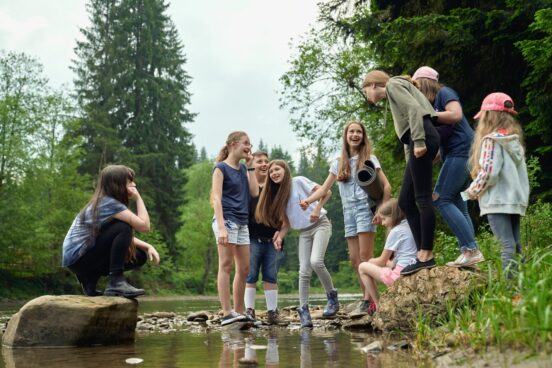In recent years, mental health challenges among teenagers have risen significantly, with issues such as anxiety, depression, and emotional distress affecting millions globally. While traditional therapies like counseling and medication are essential components in addressing these concerns, recreational therapy has emerged as a complementary, holistic approach that provides profound benefits for teens struggling with mental health issues. Alpine Academy Utah reviews how engaging in recreational activities such as hiking, swimming, and team sports can support mental health improvement in teenagers.
Understanding Recreational Therapy
Recreational therapy, also known as therapeutic recreation, involves the use of leisure activities to enhance physical, emotional, and social well-being. Unlike typical recreational activities, therapeutic recreation is guided by a structured plan and can include various exercises and group settings designed to address specific mental health goals.
For teenagers, this approach is especially effective because it allows them to engage in enjoyable activities while working through emotional challenges. This type of therapy focuses on holistic healing, allowing teens to express themselves, build resilience, and connect with others in a healthy way.
The Psychological and Emotional Benefits of Recreational Therapy
- Reduction of Anxiety and Stress: Recreational therapy provides a break from the pressures of school, social life, and other stressors. Physical activities such as hiking, swimming, and even yoga release endorphins, which are natural mood boosters. Hiking in nature, for example, can have a calming effect on the mind, helping teens disconnect from daily stress and focus on the present. Research shows that spending time outdoors in natural environments can significantly reduce symptoms of anxiety and stress.
- Enhanced Mood and Reduction in Depression Symptoms: Regular physical activity is one of the most effective ways to manage symptoms of depression. Swimming, for example, is known to have a meditative quality, where rhythmic breathing and movement help quiet the mind. Swimming in a pool or open water can also foster a sense of calm and accomplishment. Similarly, participating in team sports or group activities offers teens the chance to work toward a goal, improving their self-esteem and boosting their mood through shared victories and camaraderie.
- Improved Social Skills and Relationships: Many mental health challenges in teens stem from social isolation or difficulties in building relationships. Recreational therapy, particularly through team sports or group activities like soccer, basketball, or even dance classes, encourages teens to interact with peers in a low-pressure environment. By engaging in collaborative activities, teens learn to trust others, communicate more effectively, and develop healthy social skills. This experience can be especially beneficial for teens who struggle with anxiety in social situations, as it allows them to form bonds naturally through shared activities.
Building Resilience Through Recreational Therapy
Resilience is the ability to cope with life’s challenges, and recreational therapy helps teens build this trait by teaching them how to navigate both physical and emotional obstacles. Activities like hiking, for example, require physical endurance, patience, and problem-solving skills as teens learn to overcome difficult terrain. In a similar vein, team sports like soccer or basketball involve handling the pressure of competition, learning to deal with both success and failure, and working collaboratively toward a common goal.
When teens face these challenges in a controlled, supportive environment, they become more equipped to handle stress and adversity in their everyday lives. This experience strengthens their mental toughness and helps build a foundation for long-term emotional health.
The Physical Benefits of Recreational Therapy
While the emotional and psychological advantages are critical, recreational therapy also provides clear physical benefits. Engaging in regular physical activities such as swimming, hiking, or running helps teens maintain a healthy body weight, improves cardiovascular health, and increases strength and flexibility. These physical improvements can directly impact mental health, as teens often feel more confident and empowered when they are physically active and healthy.
Moreover, the physical exertion involved in recreational activities can help to regulate sleep patterns, which are often disrupted in teens dealing with mental health challenges. Better sleep contributes to improved mood, focus, and energy levels, which are all vital for emotional well-being.
The Role of Recreational Therapy in Self-Discovery
Adolescence is a period of self-exploration, where teens are constantly trying to understand who they are and what they value. Recreational therapy gives teens the opportunity to explore their strengths and passions outside of the traditional academic or social pressures. Activities such as hiking, horseback riding, or participating in art and music programs allow teens to engage in creative self-expression and discover new interests or talents.
This process of self-discovery is essential for developing a positive self-identity, which can greatly impact a teen’s mental health. Through recreational therapy, teens gain a sense of purpose, autonomy, and competence, all of which contribute to their overall well-being.
How to Implement Recreational Therapy for Teens
If you’re a parent or guardian of a teen struggling with mental health issues, incorporating recreational therapy into their routine can be a valuable tool. Here are a few steps to get started:
- Consult a professional: Speak with a licensed recreational therapist who can design a tailored plan to meet your teen’s specific needs.
- Start small: Encourage your teen to try various activities, such as daily walks or swimming lessons, to gauge their interest and engagement.
- Encourage group participation: Look for local recreational programs or community centers offering group activities to help foster social skills.
- Be consistent: Like any form of therapy, consistency is key. Ensure your teen has regular opportunities to engage in recreational activities that suit their interests.
Recreational therapy offers a powerful, multifaceted approach to helping teens cope with mental health challenges. Whether through hiking, swimming, or team sports, these activities provide both physical and emotional benefits that foster resilience, improve mood, and build social connections. By integrating recreational therapy into a teen’s mental health plan, parents and caregivers can help promote lasting emotional well-being and support their adolescent’s journey to a healthier, more balanced life.
